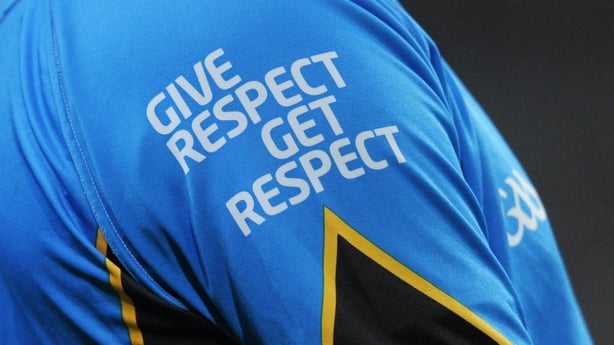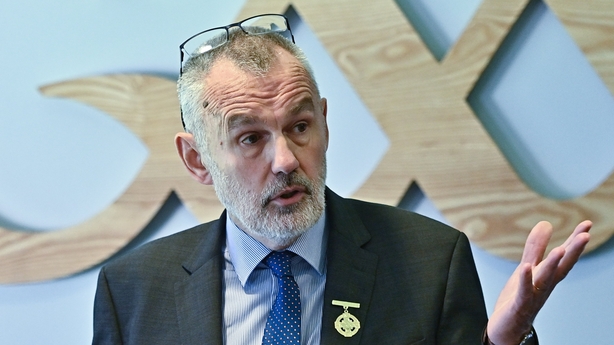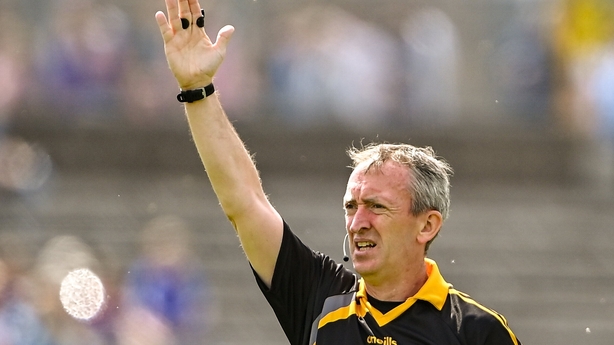This weekend the GAA will aim to implement their Respect the Referee campaign which aims to reinforce the message that the abuse of match officials will not be tolerated.
There have been several high-profile incidents recently where referees have suffered extreme forms of both verbal and physical abuse.
Last weekend, Wexford GAA handed down a 96-week ban to a club mentor involved in an alleged assault on a referee in a Junior A club football championship game.
Meath referee David Coldrick has seen his fair share over the years.
The Blackhall Gaels man began refereeing as a teenager and quickly progressed to taking charge of inter-county games. Coldrick refereed the 2005 Munster SFC final, a game which Kerry defeated Cork by a goal.
Coldrick was the man in the middle for that Galway-Armagh game, a classic which was overshadowed by a mass melee in which Coldrick sent both Aidan Nugent and Sean Kelly off.
Despite an enthralling encounter, the best game of a middling championship, Coldrick was thrust into the spotlight.
"[That game] had the good, the bad and the ugly," said Coldrick. "You don't just switch off, you do have the day job on the Monday, but it is actually always in your head for a couple of days afterwards."
"Disgusting. Scandalous. We can't hide behind this. We should be talking about a great game of football, and then they went and destroyed it."
— The Sunday Game (@TheSundayGame) June 26, 2022
The #sundaygame panel react to scenes of striking and apparent eye-gouging in the aftermath of the full-time whistle in Croke Park. pic.twitter.com/gRWROHanpv
With the arrival of social media, everyone has an opinion and everyone can express it. That can have damaging effects for those at the centre of the storm, while education and mental health supports have become vital components for inter-county refereeing.
"For me, I'm not on social media. Others obviously are and that's absolutely fine. Maybe there is stuff that I'd say from a support and education perspective. Are there things that referees can do to insulate themselves?
"It's not easy, but the mental piece is something that has become a bigger thing over the last number of years, probably with the increased attention."
'Give Respect, Get Respect' campaigns are nothing new. Recently Dr Noel Brick from Ulster University conducted research on the impacts of physical and verbal abuse on referees.
This, combined with a perceived upturn in high-profile abusive incidents, has caused the GAA to take a retrospective look at their supports for the match officials. If there are no referees, there are no games.
Last week, GAA president Larry McCarthy called for 'culture change in the GAA.'
"I think in some ways, it's easy to have 'Give Respect, Get Respect' on your shoulder," said Coldrick.
"Taking a holistic review, with input from all sections both here in Croke Park and outside the four walls, I think that's good.
"Hopefully, across the likes of sanctions, rules and education, I think there is some good stuff that should come from that review."

The championship summer was blighted by several instances of players getting off on technicalities after being shown red cards during games, and while it is frustrating, Coldrick stressed the importance of the referee fulfilling their duties to officiate the game and report accordingly.
"It is tough, there's no point saying otherwise," said Coldrick, in reference to the Central Competitions Control Committee (CCCC) overturning refereeing decisions.
"Having said that, what is important is that the referee does his or her job in terms of dealing with what they see and hear on the day.
"Report it as accurately as possible, and then you leave it to the powers that be, and what would be good, is for referees, both at national and the club level, to get feedback from those committees where there are sanctions overturned as to the reasons why.
"It's not always transparent as to why they were overturned, because maybe it's something that we're doing wrong, we're not reporting correctly or whatever.
"So I think that feedback loop is something that isn't there, which would be important if there's stuff that we can do that can tighten up that process and eliminate some of the loopholes, then obviously, we're all for it. But that feedback loop isn't always there and I think that would be important going forward."

The strength of sanctions has also come up for debate, with Coldrick telling the tale of his own experiences.
"I think it is partly sanctions, but it's not just sanctions for the individual, I think it's trying to broaden out the responsibility on clubs and the accountability on clubs," said Coldrick.
"Yes, the individual needs to take responsibility, but you can have instances and I know, of instances where, an individual mentor at a juvenile level is suspended, and the club is fined.
"But actually, the fine is paid by the individual. So therefore the club doesn't really have to take responsibility, and they are making the person accountable, because they're paying the fine.
"He goes out and he does it again, which, in one particular instance, I know did happen. Again, he got a longer ban, he got a 48-week ban.
"He still paid the fine himself and the following week that juvenile team are in a county final and he turned up, and he started again. So I think kind of broadening out from just the individual is something that needs to be looked at on the sanctions piece."

Refereeing recruitment has somewhat surprisingly increased, but the retention of those referees after year two or three is where the challenge lies.
Coldrick had some advice for those future custodians of the game.
"I started when I was 16/17 and there were tough times but I really wanted to make it to the top," said Coldrick.
"The important thing is getting a good support team behind you. So that's your umpires for a start, but also within your county, the buddying up with a senior [referee], someone that you can actually talk to when those tough days do come, and how to get over them, but also to report abuse, if there is abuse then leave it to the powers that be once you've done that job.
"It is an enjoyable pastime. Yes, of course, you'd like to be the player on what used to be the third Sunday in September, but for me the next best thing is actually being a referee."
Watch the Leinster Football Club Championship Round 1 game, Palatine (Carlow) v St Patrick's (Wicklow), on Saturday from 7.45pm live on RTÉ2 and RTÉ Player


